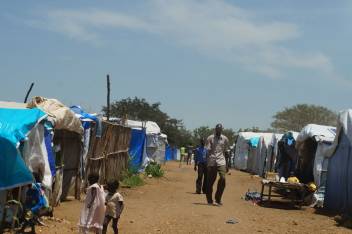 Juma is in his mid-fifties. He is employed by HelpAge as a community mobiliser in Protection of Civilians (POC) 2, one of the areas secured by the UN troops in Juba, for the protection of civilians.
Juma is in his mid-fifties. He is employed by HelpAge as a community mobiliser in Protection of Civilians (POC) 2, one of the areas secured by the UN troops in Juba, for the protection of civilians.
This is, in other words, a camp for internally displaced people, a place where a few thousand people live without being able to leave.
This afternoon, Juma has agreed to meet me in POC 2 to take me to some older people’s tents. As a community mobiliser, he knows all the older people in the camp and identified them to be part of a HelpAge distribution of mats, blankets, soap and mattresses.
“This camp is good,” he tells me when I ask about the conditions here when it rains. “Here in Juba, the water flows away, it doesn’t flood.”
Unable to leave
He is obviously thinking of his mother, Pekran, aged 75, who he brought from Bentiu by plane a month ago. She was staying there in another camp with one of her daughters, but during the rainy season, the camp was flooded for long periods of time.
The food supply in Malakal POC, Upper Nile State, was also not as regular as in Juba. Now that his mother is with him, he is happy to take her to the health centre to have her checked (she is coughing and feels weak), and to the eye camp that Handicap International is organising this month. She has been registered, and will receive specialised eye care in a few days.
All this is available in the camp, as they are not allowed to leave it. Juma is also able to buy some “good food” for his mother: fresh milk, which is so valued by the Nuer people, some meat, and “walwal”, a thick porridge of sorghum, “with milk”, he says with a lot of conviction.
Poor health
Before meeting his mother, Juma has taken me to see Lam Wako who is over 80 and in a very sad state. Lam travelled from Jonglei State to Juba with his son and his son’s wife to get medical care for a very bad abscess on his right foot, probably linked with diabetes.
While in Juba, the civil conflict broke out. His son returned to Jonglei, leaving Lam in the care of his wife. They ended up here in POC 2. Lam is supposedly receiving care for his foot and he has a wheelchair provided by Handicap International.
But when I visit his tent, I see a very weak old man, almost blind, severely undernourished, with a very bad abscess on his foot, which does not seem to have been cleaned. He is suffering a lot. He says something to me from the entrance of his tent, and retreats into the dark.
Juma translates: “He says; if you can, please put him on a plane and send him back to his son. He can take care of him.”
Inwardly, I agree. The right thing to do would be to allow this man to go back to his son.
Juma tells me the doctors want to operate on his leg. He is so emaciated that he will not survive. Traditional funerals are not allowed in the camp, bodies are buried safely but with indifference.
Then I meet Luluth, a 70-year-old man who is proud to tell me that when he was young he was in the British troops in 1955, before Sudan’s independence. He is full of energy, and warns me, “don’t talk to young men, they don’t tell the truth!”
Though his family has fled to Ethiopia, Luluth has found some relatives in POC 2 who can help him to cook. He has also received items from HelpAge, as well as cash vouchers from Oxfam. With this, he can buy milk and meat.
“Food is good, but cash is better!” he says with a large and toothless grin.
Some sense of community
Other older people now approach to talk to me. I meet Mary and then Deng, who is blind. All of them want to tell me their story. Contrary to younger people, older people want to talk. The crowd under the tree is getting bigger, but the atmosphere is friendly and relaxed.
Younger men are watching attentively, and laughing at some funny comments from their elders. There is some sense of a community.
However I have to say my farewells and go through the barbed wire, the UN check points and the barricade around the camp.
How we’re helping
HelpAge has been providing items such as blankets and soap to the most vulnerable older people in the three POCs. We are also involved in bringing older people together in social centres where they can meet and socialise.
We are organising psychosocial services for older people, mostly group discussions, with the possibility of referring the most affected to individual counselling provided by Handicap International.
Find out more about our work in South Sudan.
